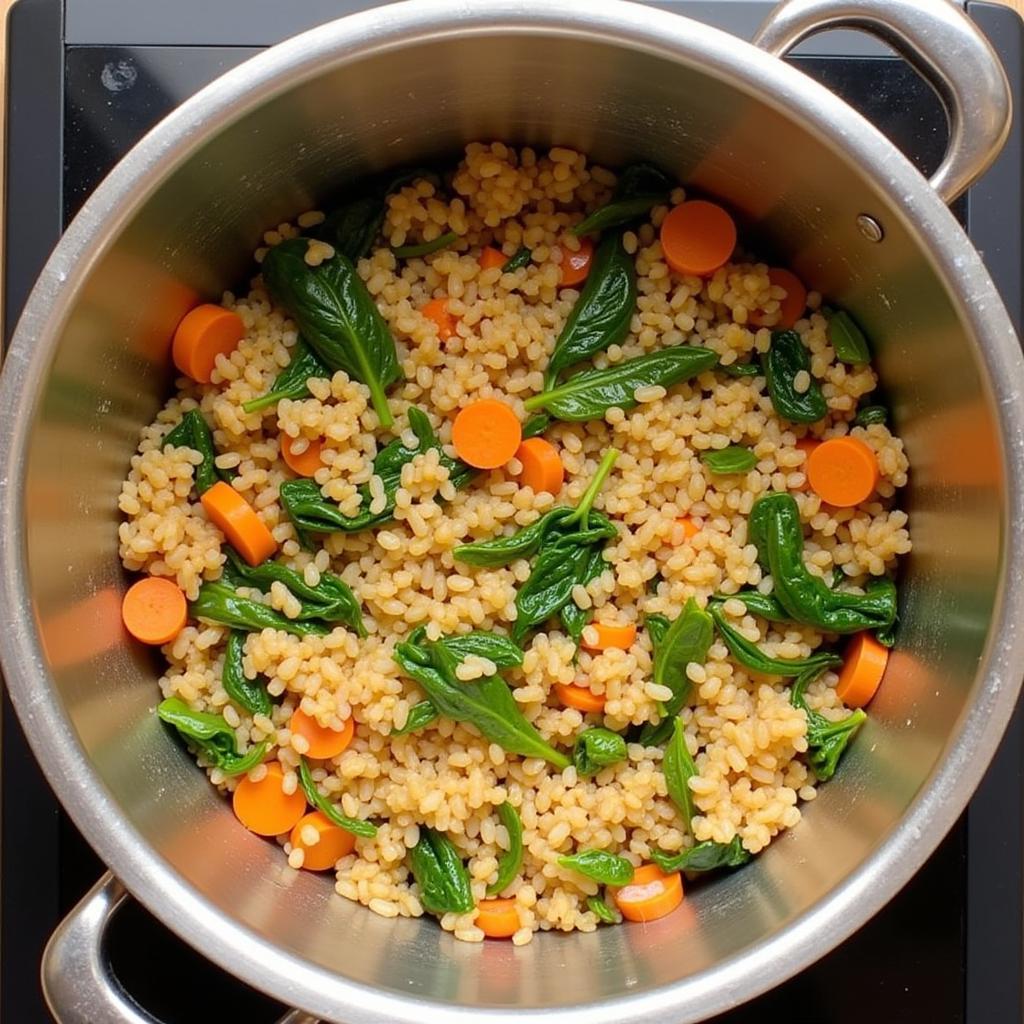Providing a balanced and nutritious diet is crucial for your dog’s health and well-being. While commercially available vegan dog food options are becoming increasingly common, many dog owners are turning to homemade recipes to have complete control over their furry friend’s meals. This comprehensive guide will delve into the world of Vegan Dog Food Recipes, providing you with the knowledge and tools to create delicious and healthy meals that meet your canine companion’s specific nutritional needs.
Understanding Vegan Dog Food
A vegan diet for dogs excludes all animal products, including meat, poultry, fish, eggs, and dairy. Instead, it relies on plant-based ingredients such as fruits, vegetables, legumes, grains, and supplements to provide essential nutrients. While it might seem unconventional, dogs can thrive on a carefully planned vegan diet.
Is a Vegan Diet Safe for My Dog?
While dogs are often classified as omnivores, they are actually scavenging carnivores, meaning that while their digestive system can process some plant matter, they primarily obtain nutrients from animal sources. Therefore, transitioning your dog to a vegan diet requires careful consideration and planning.
It’s crucial to consult with a veterinarian or a certified veterinary nutritionist before making any dietary changes for your dog. They can help assess your dog’s individual needs, recommend appropriate supplements, and create a balanced meal plan.
Essential Nutrients for Vegan Dogs
Just like humans, dogs require a specific balance of nutrients to thrive. When formulating a vegan dog food recipe, it’s essential to ensure that it provides the following:
-
Protein: The building blocks of cells, crucial for muscle growth and repair. Excellent plant-based protein sources for dogs include lentils, chickpeas, tofu, quinoa, and peas.
-
Fat: Provides energy and supports cell function. Healthy fats can be incorporated through ingredients like coconut oil, flaxseed oil, and chia seeds.
-
Carbohydrates: A primary energy source. Opt for whole grains like brown rice, quinoa, and oats.
-
Vitamins and Minerals: Essential for various bodily functions. Include a variety of fruits and vegetables like blueberries, spinach, carrots, and sweet potatoes to ensure a diverse intake of vitamins and minerals.
-
Taurine: An amino acid that plays a vital role in heart health and vision. While dogs can synthesize taurine in small amounts, it’s often necessary to supplement it in a vegan diet.
Crafting the Perfect Vegan Dog Food Recipe
Creating a balanced vegan dog food recipe doesn’t have to be complicated. Here’s a simple and nutritious recipe to get you started:
Yields: Approximately 6 cups
Prep time: 20 minutes
Cook Time: 30 minutes
Ingredients:
-
1 cup brown rice
-
1 cup red lentils
-
1 cup chopped carrots
-
1/2 cup chopped spinach
-
1/4 cup chopped parsley
-
1 tablespoon coconut oil
-
1 teaspoon ground flaxseed
-
1/2 teaspoon turmeric powder
 A pot of vegan dog food simmering on a stovetop
A pot of vegan dog food simmering on a stovetop
Instructions:
-
Rinse the brown rice and lentils under cold water until the water runs clear.
-
In a large pot, combine the rinsed rice and lentils with 4 cups of water. Bring to a boil over medium-high heat.
-
Reduce heat to low, cover, and simmer for 25-30 minutes, or until the rice and lentils are tender.
-
While the rice and lentils are cooking, prepare the vegetables. Chop the carrots, spinach, and parsley into small, bite-sized pieces.
-
In a separate pan, heat the coconut oil over medium heat. Add the chopped vegetables and cook for 5-7 minutes, or until softened.
-
Once the rice and lentils are cooked, add the cooked vegetables, ground flaxseed, and turmeric powder to the pot. Stir well to combine.
-
Allow the mixture to cool completely before serving or storing.
This recipe is a great starting point, and you can customize it based on your dog’s preferences and dietary needs.
Tips for Success
-
Gradual Transition: When switching your dog to a vegan diet, it’s crucial to do so gradually over 7-10 days. Start by replacing a small portion of their regular food with the vegan alternative and gradually increase the ratio over time.
-
Monitor Your Dog: Pay close attention to your dog’s health, weight, and stool consistency during and after the transition to a vegan diet. If you notice any adverse reactions, consult with your veterinarian immediately.
-
Supplements: Supplementing your dog’s diet with essential nutrients like taurine, vitamin B12, and L-carnitine is crucial for their well-being. Discuss appropriate supplements with your veterinarian to ensure you’re meeting your dog’s specific needs.
-
Variety is Key: Just like humans, dogs benefit from a varied diet. Don’t be afraid to experiment with different vegan dog food recipes, ingredients, and flavors to keep your furry friend interested and excited about their meals.
 A happy dog enjoying a bowl of vegan food
A happy dog enjoying a bowl of vegan food
Conclusion
Transitioning your dog to a vegan diet can be a rewarding experience, allowing you to provide them with nutritious and ethical meals. By understanding their nutritional needs, consulting with a veterinarian, and using our guide to vegan dog food recipes, you can ensure that your furry friend thrives on a plant-based lifestyle. Remember, a well-planned vegan diet can be just as healthy and delicious as a traditional one, keeping your canine companion happy, healthy, and full of energy for years to come.
FAQ
1. Is it more expensive to feed my dog a vegan diet?
The cost of a vegan dog food diet can vary depending on the ingredients used and whether you choose to buy pre-made vegan dog food or make it yourself. Homemade vegan dog food can be more affordable than some premium commercial brands, especially if you buy ingredients in bulk.
2. What are some signs of nutritional deficiencies in dogs?
Common signs of nutritional deficiencies in dogs can include weight loss, dull coat, skin problems, lethargy, digestive issues, and weakened immune system. If you notice any of these signs, it’s essential to consult with your veterinarian.
3. Where can I find more vegan dog food recipes?
There are numerous online resources, cookbooks, and even apps dedicated to vegan dog food recipes. A quick search online will provide you with a wealth of information and inspiration for creating delicious and nutritious meals for your furry friend.
4. Can puppies eat vegan dog food?
Puppies have very specific nutritional needs for their growth and development. It’s crucial to consult with a veterinarian before transitioning a puppy to a vegan diet to ensure that all their nutritional requirements are met.
5. Are there any vegan dog treats available?
Yes, there is a growing market for vegan dog treats. Many pet stores now offer a variety of plant-based treats made with ingredients like sweet potatoes, peanut butter, apples, and carrots.
Have any further questions? Please reach out! We are here to support you in providing the best possible care for your furry friend. Contact us at Phone Number: 02437655121, Email: minacones@gmail.com. You can also visit us at 3PGH+8R9, ĐT70A, thôn Trung, Bắc Từ Liêm, Hà Nội, Việt Nam. Our dedicated customer support team is available 24/7 to assist you.
Looking for more ways to nourish your canine companion? Check out our articles on the best foods for glute growth (yes, even dogs can benefit from a little glute action!) and our recommendations for the simple french food book if you want to add a touch of Parisian flair to your dog’s diet!